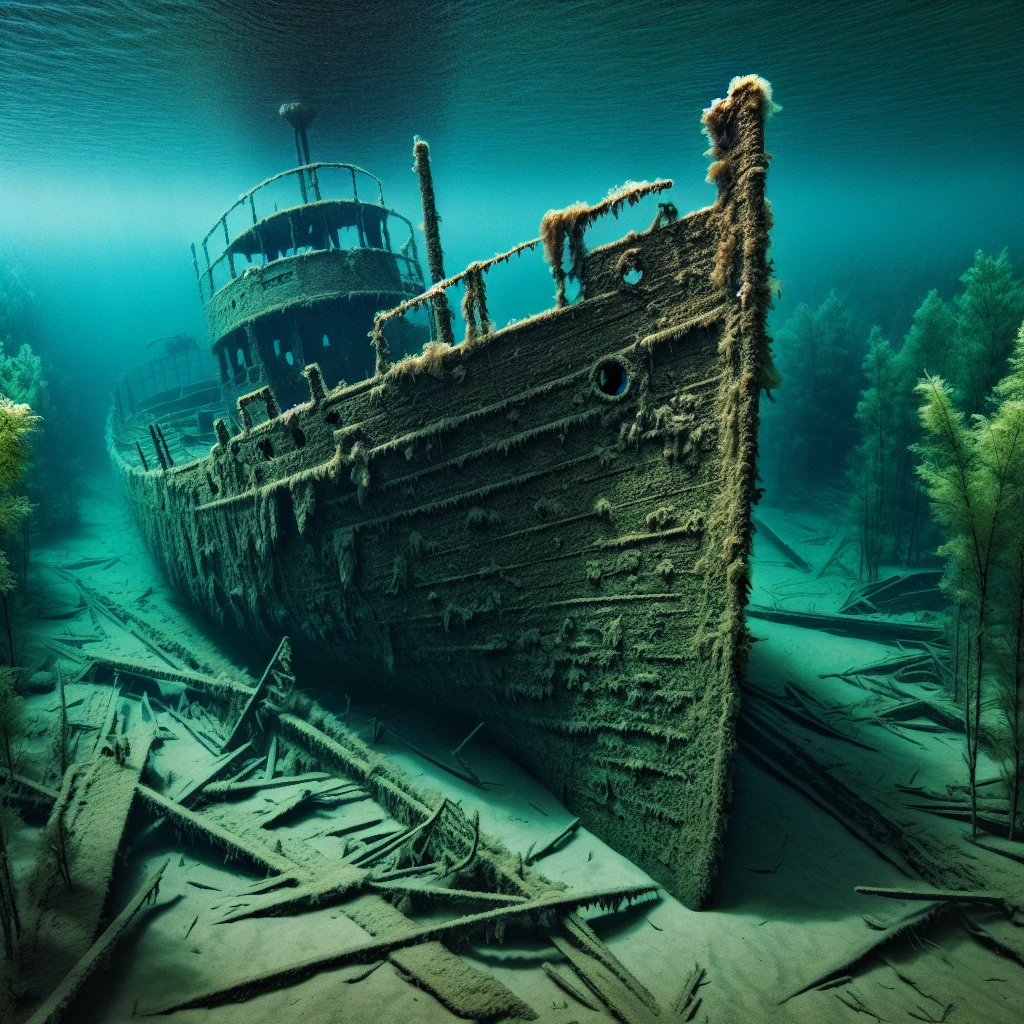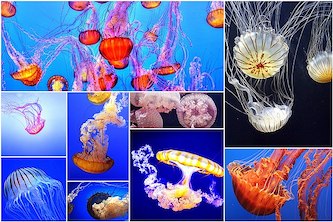Filmmakers Yvonne Drebert and Zach Melnick were looking for invasive mussels in Lake Huron, Canada when they accidentally found a really old shipwreck called the ‘Africa.’ The ship sank in 1895 and no one knew where it was until now.
The filmmakers were just doing their research when they stumbled upon the shipwreck. It’s a big deal because it gives us a peek into what life was like in the late 1800s and tells us about how people traded goods by boat.
Lake Huron has a lot of shipwrecks, and the filmmakers were hoping to find some mussels. But instead, they found the ‘Africa’ shipwreck, which is in really good condition. It’s a reminder of how tough it was for sailors back then.
Experts are now studying the ‘Africa’ to learn more about it. This shipwreck is a reminder of the cool history of the Great Lakes region and all the stories that are hidden underwater. It shows us that exploring and finding unexpected things is important. And it reminds us to take care of historical artifacts so we can learn more about our past.
Original news source: Filmmakers discover 128-year-old shipwreck (BBC)
Listen
Slow
Normal
Fast
Group or Classroom Activities
Warm-up Activities:
– Headline Creation
Instructions: In pairs or small groups, students will create a catchy headline for the article about the discovery of the ‘Africa’ shipwreck. Encourage them to be creative and use their knowledge of vocabulary and grammar to make the headline engaging and informative.
– Vocabulary Pictionary
Instructions: Divide the class into two teams. Give each team a set of vocabulary words from the article. One student from each team will come to the front of the class and draw a picture representing one of the words. The team members must guess the word based on the drawing. The team with the most correct guesses wins.
– Word Association
Instructions: Write the word “shipwreck” on the board. Ask the students to brainstorm as many words or phrases related to shipwrecks as they can in one minute. After the time is up, go around the class and have each student share one word or phrase. Encourage them to think of both positive and negative associations.
– Future Predictions
Instructions: In pairs or small groups, students will discuss and make predictions about what might happen next in the story. They should consider possible discoveries, research findings, or implications of finding the ‘Africa’ shipwreck. After the discussion, have each group share their predictions with the class.
– Opinion Spectrum
Instructions: Write the statement “Exploring and finding unexpected things is important” on the board. Ask the students to stand in a line, with one end representing “strongly disagree” and the other end representing “strongly agree.” Read the statement aloud and have the students position themselves along the spectrum according to their opinion. Then, ask a few students to explain their position and have a class discussion about the statement.
Comprehension Questions:
1. How did filmmakers Yvonne Drebert and Zach Melnick discover the shipwreck called the ‘Africa’?
2. Why is finding the ‘Africa’ shipwreck a big deal?
3. What were the filmmakers originally searching for in Lake Huron?
4. How does the discovery of the ‘Africa’ shipwreck give us insight into the past?
5. Why is the good condition of the ‘Africa’ shipwreck significant?
6. What are experts currently doing with the ‘Africa’ shipwreck?
7. What does the discovery of the ‘Africa’ shipwreck remind us about the Great Lakes region?
8. Why is it important to take care of historical artifacts like the ‘Africa’ shipwreck?
Go to answers ⇩
Listen and Fill in the Gaps:
Filmmakers Yvonne Drebert and Zach Melnick were looking for invasive mussels in Lake Huron, Canada when they accidentally found a really old shipwreck called the ‘Africa.’ The ship sank in 1895 and no one knew where it was until now.
The filmmakers were just doing their research when they stumbled upon the shipwreck. It’s a big deal because it (1)______ us a peek into what life was like in the late 1800s and tells us about how people traded (2)______ by boat.
Lake (3)______ has a lot of shipwrecks, and the filmmakers were hoping to find some (4)______. But instead, they found the ‘Africa’ (5)______, which is in really good condition. It’s a reminder of how tough it was for sailors back then.
Experts are now studying the ‘Africa’ to (6)______ more about it. This shipwreck is a reminder of the cool (7)______ of the Great (8)______ region and all the stories that are hidden underwater. It shows us that exploring and finding (9)______ things is important. And it reminds us to take care of historical artifacts so we can learn more about our past.
Go to answers ⇩
Discussion Questions:
Students can ask a partner these questions, or discuss them as a group.
1. What do you think it would be like to explore a shipwreck?
2. How would you feel if you accidentally discovered something really important?
3. Do you think it’s important to learn about history? Why or why not?
4. Have you ever found something unexpected? What was it and how did you feel?
5. What do you think the filmmakers were hoping to find when they were looking for mussels?
6. Do you like learning about the past? Why or why not?
7. If you could explore any shipwreck, which one would you choose and why?
8. How do you think the sailors felt when their ship sank?
9. What is a historical artifact? Can you think of any examples?
10. How do you think the ‘Africa’ shipwreck can teach us about life in the late 1800s?
11. Do you think it’s important to preserve historical artifacts? Why or why not?
12. How do you think the filmmakers felt when they realized they had found the ‘Africa’ shipwreck?
13. What do you think the experts will learn from studying the shipwreck?
14. Have you ever been to a museum with historical artifacts? What was your favorite artifact?
15. Do you think there are more hidden stories underwater? Why or why not?
Individual Activities
Vocabulary Meanings:
Match each word to its meaning.
Words:
1. invasive
2. mussels
3. shipwreck
4. accidentally
5. condition
6. sailors
7. artifacts
8. underwater
Meanings:
(a) Below the surface of the water
(b) Small shellfish that live in water
(c) A boat that has sunk and is underwater
(d) Happening by chance or mistake
(e) The state or quality of something
(f) Objects made by humans that have historical value
(g) Something that is not supposed to be there
(h) People who work on a ship
Go to answers ⇩
Multiple Choice Questions:
1. How did Yvonne Drebert and Zach Melnick find the shipwreck?
(a) They were exploring the Great Lakes region.
(b) They were looking for invasive mussels in Lake Huron, Canada.
(c) They were studying the history of boat trading.
(d) They accidentally stumbled upon it while swimming.
2. Why is the discovery of the ‘Africa’ shipwreck significant?
(a) It provides insight into life in the late 1800s and how goods were traded by boat.
(b) It is the oldest shipwreck ever found in Lake Huron.
(c) It reveals secrets about the Great Lakes region.
(d) It is a reminder of the dangers sailors faced back then.
3. What were Yvonne Drebert and Zach Melnick originally searching for in Lake Huron?
(a) Other shipwrecks.
(b) Invasive mussels.
(c) Historical artifacts.
(d) Hidden treasures.
4. What is the condition of the ‘Africa’ shipwreck?
(a) It is completely destroyed.
(b) It is partially submerged.
(c) It is covered in mussels.
(d) It is in really good condition.
5. What are experts currently doing with the ‘Africa’ shipwreck?
(a) Restoring it to its original state.
(b) Selling artifacts from the ship.
(c) Studying it to learn more about its history.
(d) Using it as a tourist attraction.
6. What does the discovery of the ‘Africa’ shipwreck teach us?
(a) The dangers of sailing in Lake Huron.
(b) The history of boat trading in the Great Lakes region.
(c) The significance of invasive mussels.
(d) The importance of exploring and finding unexpected things.
7. What does the article remind us to do with historical artifacts?
(a) Take care of them so we can learn more about our past.
(b) Sell them to collectors for profit.
(c) Display them in museums for public viewing.
(d) Use them as tourist attractions.
8. What is the main message of the article?
(a) Invasive mussels are a threat to Lake Huron.
(b) Filmmakers are skilled at finding shipwrecks.
(c) Discoveries like the ‘Africa’ shipwreck provide valuable insights into history.
(d) The Great Lakes region is full of hidden treasures.
Go to answers ⇩
True or False Questions:
1. Filmmakers Yvonne Drebert and Zach Melnick intentionally discovered an old shipwreck called the ‘Africa’ while searching for invasive mussels in Lake Huron, Canada.
2. The shipwreck, which sank in 1895, had been unknown until now.
3. The shipwreck is not remarkably well-preserved and does not serve as a reminder of the challenges faced by sailors in the past.
4. This discovery highlights the fascinating history of the Great Lakes region and the hidden stories submerged beneath its waters.
5. Experts are not currently studying the ‘Africa’ shipwreck to gain a deeper understanding of its history.
6. Lake Huron is home to numerous shipwrecks, and the filmmakers were hoping to find mussels but found the ‘Africa’ shipwreck instead.
7. It emphasizes the importance of exploration and unexpected findings, as well as the need to preserve historical artifacts for a better understanding of our past.
8. The filmmakers were not conducting research when they unexpectedly stumbled upon the shipwreck, providing valuable insights into life in the late 1800s and the transportation of goods by boat.
Go to answers ⇩
Write a Summary:
Write a summary of this news article in two sentences.
Check your writing now with the best free AI for English writing!
Writing Questions:
Answer the following questions. Write as much as you can for each answer.
Check your answers with our free English writing assistant!
1. How did filmmakers Yvonne Drebert and Zach Melnick come across the shipwreck called the ‘Africa’?
2. Why is the discovery of the ‘Africa’ shipwreck significant?
3. What were the filmmakers originally searching for in Lake Huron?
4. What does the ‘Africa’ shipwreck teach us about life in the late 1800s?
5. Why is it important to study and preserve historical artifacts like the ‘Africa’ shipwreck?
Answers
Comprehension Question Answers:
1. How did filmmakers Yvonne Drebert and Zach Melnick discover the shipwreck called the ‘Africa’?
They stumbled upon the shipwreck while looking for invasive mussels in Lake Huron, Canada.
2. Why is finding the ‘Africa’ shipwreck a big deal?
It gives us a glimpse into what life was like in the late 1800s and tells us about how people traded goods by boat.
3. What were the filmmakers originally searching for in Lake Huron?
They were originally searching for invasive mussels.
4. How does the discovery of the ‘Africa’ shipwreck give us insight into the past?
It shows us the challenges sailors faced in the late 1800s and gives us a better understanding of history.
5. Why is the good condition of the ‘Africa’ shipwreck significant?
The good condition of the shipwreck means that we can learn more about it and gather valuable information about the past.
6. What are experts currently doing with the ‘Africa’ shipwreck?
Experts are studying the shipwreck to learn more about it and uncover its history.
7. What does the discovery of the ‘Africa’ shipwreck remind us about the Great Lakes region?
It reminds us of the rich history and stories that are hidden underwater in the Great Lakes region.
8. Why is it important to take care of historical artifacts like the ‘Africa’ shipwreck?
Taking care of historical artifacts allows us to preserve our past and learn more about our history.
Go back to questions ⇧
Listen and Fill in the Gaps Answers:
(1) gives
(2) goods
(3) Huron
(4) mussels
(5) shipwreck
(6) learn
(7) history
(8) Lakes
(9) unexpected
Go back to questions ⇧
Vocabulary Meanings Answers:
1. invasive
Answer: (g) Something that is not supposed to be there
2. mussels
Answer: (b) Small shellfish that live in water
3. shipwreck
Answer: (c) A boat that has sunk and is underwater
4. accidentally
Answer: (d) Happening by chance or mistake
5. condition
Answer: (e) The state or quality of something
6. sailors
Answer: (h) People who work on a ship
7. artifacts
Answer: (f) Objects made by humans that have historical value
8. underwater
Answer: (a) Below the surface of the water
Go back to questions ⇧
Multiple Choice Answers:
1. How did Yvonne Drebert and Zach Melnick find the shipwreck?
Answer: (b) They were looking for invasive mussels in Lake Huron, Canada.
2. Why is the discovery of the ‘Africa’ shipwreck significant?
Answer: (a) It provides insight into life in the late 1800s and how goods were traded by boat.
3. What were Yvonne Drebert and Zach Melnick originally searching for in Lake Huron?
Answer: (b) Invasive mussels.
4. What is the condition of the ‘Africa’ shipwreck?
Answer: (d) It is in really good condition.
5. What are experts currently doing with the ‘Africa’ shipwreck?
Answer: (c) Studying it to learn more about its history.
6. What does the discovery of the ‘Africa’ shipwreck teach us?
Answer: (d) The importance of exploring and finding unexpected things.
7. What does the article remind us to do with historical artifacts?
Answer: (a) Take care of them so we can learn more about our past.
8. What is the main message of the article?
Answer: (c) Discoveries like the ‘Africa’ shipwreck provide valuable insights into history.
Go back to questions ⇧
True or False Answers:
1. Filmmakers Yvonne Drebert and Zach Melnick intentionally discovered an old shipwreck called the ‘Africa’ while searching for invasive mussels in Lake Huron, Canada. (Answer: False)
2. The shipwreck, which sank in 1895, had been unknown until now. (Answer: True)
3. The shipwreck is not remarkably well-preserved and does not serve as a reminder of the challenges faced by sailors in the past. (Answer: False)
4. This discovery highlights the fascinating history of the Great Lakes region and the hidden stories submerged beneath its waters. (Answer: True)
5. Experts are not currently studying the ‘Africa’ shipwreck to gain a deeper understanding of its history. (Answer: False)
6. Lake Huron is home to numerous shipwrecks, and the filmmakers were hoping to find mussels but found the ‘Africa’ shipwreck instead. (Answer: True)
7. It emphasizes the importance of exploration and unexpected findings, as well as the need to preserve historical artifacts for a better understanding of our past. (Answer: True)
8. The filmmakers were not conducting research when they unexpectedly stumbled upon the shipwreck, providing valuable insights into life in the late 1800s and the transportation of goods by boat. (Answer: False)
Go back to questions ⇧















